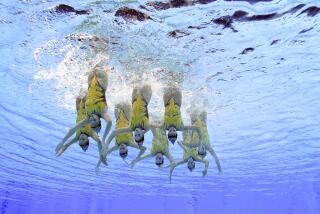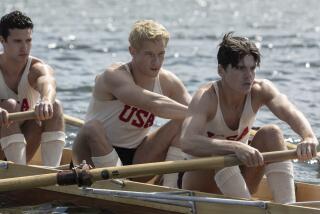Ernestine Bayer, 97; Women’s Rowing Pioneer
- Share via
In 1938, a woman’s place was generally in the home, perhaps in a suitable office job, but certainly not in a boathouse. Until Ernestine Bayer came along, that is.
Bayer, an athletic woman who wasn’t satisfied watching her husband row in world-class races, started the first women’s rowing club on the stretch of the Schuylkill River in Philadelphia called Boathouse Row.
For the record:
12:00 a.m. Oct. 7, 2006 For The Record
Los Angeles Times Saturday October 07, 2006 Home Edition Main News Part A Page 2 National Desk 1 inches; 47 words Type of Material: Correction
Ernestine Bayer obituary: A photo caption accompanying an obituary of women’s rowing pioneer Ernestine Bayer in Monday’s California section said Bayer organized the first U.S. women’s rowing club. She started the first women’s rowing club on the stretch of the Schuylkill River in Philadelphia called Boathouse Row.
She encouraged other women to row and pushed to gain women a chance to compete internationally, culminating in the addition of women’s rowing to the Olympics in 1976. And she coached, taught and competed in rowing well into her 90s.
Called the mother of women’s rowing and honored with many of the sport’s highest awards, Bayer died Sept. 10. She was 97.
Bayer, who was known to everyone as Ernie, died of pneumonia at a hospital in Exeter, N.H., her daughter, Tina Bayer, said.
Anita DeFrantz, president of the Amateur Athletic Foundation and a member of the International Olympic Committee, won a bronze medal for the United States at that first Olympic women’s rowing competition in Montreal.
“Ernie Bayer was truly an icon for our sport,” DeFrantz told The Times last week.
Bayer was the first woman named to the National Rowing Foundation’s Hall of Fame, the first woman to receive the U.S. Rowing Medal for service and feats in rowing and the first woman to win U.S. Rowing’s Carlin Award for service to the sport. She was also nominated for the Sullivan Award, given annually to the top U.S. amateur athlete.
But none of this came easily.
Born March 25, 1909, in Philadelphia, Ernestine Steppacher longed to play the games her brother Augustus did. Though her mother disapproved, Ernestine secretly taught herself to ride his bike, and she would take small boats to go crabbing in Delaware Bay.
After attending secretarial school she worked as a runner in a bank, delivering messages. Run she did, sometimes from bank to bank, sometimes using the fire escape to go from floor to floor in her building.
Her first date with her future husband, Ernest Bayer -- also known as Ernie -- was at a swimming pool in 1927. He also worked at a bank, but his life was devoted to rowing. He won a silver medal at the 1928 Summer Olympics, competing in the four-oared shell without coxswain. After the Amsterdam Games, Ernestine and Ernest announced their marriage.
Back in Philadelphia, Ernest rowed at the Pennsylvania Barge Club and Ernestine watched. She would ask him why she couldn’t join in and he would answer that women just didn’t row. But she persisted ... for 10 years. One day she saw another woman rowing a boat she had borrowed from her boyfriend. Finally Ernest relented and taught Ernestine to row using a boat from his club.
The reaction from the disapproving male rowers was immediate.
“Men wouldn’t talk to my husband because he permitted me to row,” Ernestine told a Boston Globe reporter in 1992. “Permitted me. Can you imagine?”
But once Ernestine started rowing, Ernest was supportive. She found a backer at the bank who agreed to rent space to her at a Schuylkill boathouse, and she recruited 16 friends and co-workers to form the Philadelphia Girls Rowing Club in 1938.
At first the male rowers resisted, saying women would take away valuable space in boathouses and on the water. Others assumed the female rowers were just looking for husbands, Tina Bayer said. But some of the women were serious athletes, and their numbers slowly grew.
By the 1960s women’s rowing clubs in the United States were competing against each other in regattas, and Ernestine Bayer sought to enter a U.S. team in the 1967 European women’s championships.
But the women did not have the support of the U.S. men’s governing body for rowing. Its president, John Carlin, feared the U.S. women would be humiliated in international competition dominated by the more established, state-supported teams from behind the iron curtain.
But after Bayer’s club won an exhibition in Canada against a team of oarsmen who had recently retired from top-tier racing, the president of the international rowing organization overruled the national decision. Bayer’s team, which included her daughter, was allowed to represent the United States in Vichy, France.
The U.S. women did not win a race at the European Championships, but their participation provided the impetus for the international sporting community to recognize that women’s rowing was worthy of being added to the Olympic slate. Bayer was chosen to be a member of the first U.S. Olympic women’s rowing committee in preparation for the 1976 Games.
The Bayers moved to New Hampshire in 1971, three years after Ernest retired as senior vice president of First Pennsylvania Bank. Also elected to the rowing hall of fame for his Olympic results and years spent as an international rowing referee, Ernest died in 1997.
Ernestine and Tina volunteered to coach a new women’s club crew team at the University of New Hampshire. At that time Ernestine also founded the Alden Ocean Shell Assn., which has become one of the largest recreational rowing groups in the country.
While teaching and coaching generations of rowers, Ernestine Bayer also loved to race. In 2000, at age 91, she rowed in the Master’s World Championships, winning the women’s double and eight races, against competitors 20 and 30 years younger.
After suffering a minor stroke in 2003, Bayer began rowing as part of her rehabilitation, but another stroke in July 2005 put her on the dock for good.
During her hall of fame induction in 1984, at age 75, Bayer was invited to row with the U.S. women’s Olympic team that won gold at the Los Angeles Games.
“It was one of the most glorious things I’ve seen in rowing,” DeFrantz said. “There was no one more deserving than Ernie to have rowed with the gold-medal team.”
Friends plan to gather Oct. 15 in Exeter for a rowing flotilla in Bayer’s honor, and she’ll be honored Oct. 21 and 22 at the Head of the Charles Regatta in Boston.
Tina Bayer, her only survivor, has established a fund in her mother’s name for rowing scholarships, stipends and start-up programs. Donations may be sent to Daniel Jones Escrow, in the account of Ernestine Bayer, P.O. Box 526, Exeter, NH 03833-0526.
*
More to Read
Go beyond the scoreboard
Get the latest on L.A.'s teams in the daily Sports Report newsletter.
You may occasionally receive promotional content from the Los Angeles Times.






